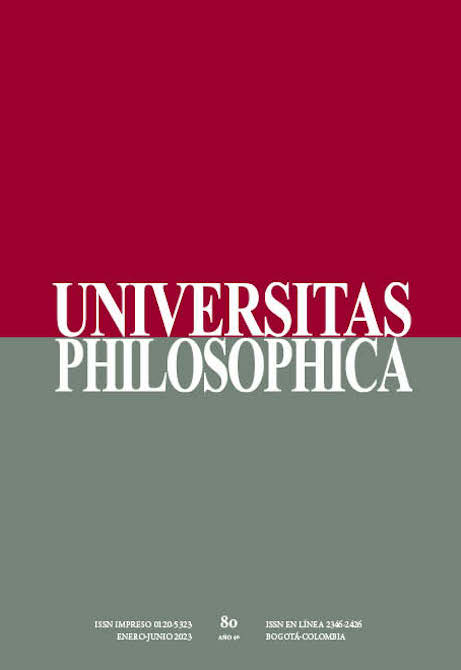Resumen
Este artículo rastrea el concepto de capacidad en la filosofía crítica, así como en la transición a la misma, de Immanuel Kant con el fin de reconstruir sus usos y los efectos que tiene para la reflexión filosófica posterior, atendiendo, en especial, a la manera en la que se ha construido al sujeto racional universal. Los efectos derivados de este análisis serán contrastados con algunas perspectivas críticas sobre la (dis)capacidad y el capacitismo con el fin de cuestionar las posturas kantianas y mostrar la productividad filosófica de una aproximación anacrónica que pone en contacto la historia de la filosofía en Occidente con el presente problemático que vivimos.
Arendt, H. (2003). Conferencias sobre la filosofía política de Kant (trad. C. Corral). Paidós.
Borges, M. (2021). Kant on Eating and Drinking. Con-Textos Kantianos. International Journal of Philosophy, 13, 234–244.
Butler, J. (2012). Precarious Life, Vulnerability, and the Ethics of Cohabitation. The Journal of Speculative Philosophy, 26(2), 134–151. https://doi.org/10.5325/jspecphil.26.2.0134
Campbell, F. K. (2001). “Disability’s” Date with Ontology and the Ableist Body of the Law. Griffith Law Review, 10(1), 42–62.
Campbell, F. K. (2009). Contours of Ableism: The Production of Disability and Abledness. Palgrave Macmillan. https://doi.org/10.1057/9780230245181
Cohen, A. A. (2008). The Ultimate Kantian Experience: Kant on Dinner Parties. History of Philosophy Quarterly, 25(4), 315–336.
Cubo Ugarte, Ó. (2010). Corporalidad y vida en la filosofía crítica de Kant. Ideas y Valores, 143, 109–122.
David-Ménard, M. (1992). La folie dans la raison pure. Les Cahiers du GRIF, 46, 41–45.
David-Ménard, M. (2000). Kant’s “An Essay on the Maladies of the Mind” and Observa-tions on the Feeling of the Beautiful and the Sublime (trad. A. Ross). Hypatia, 15(4), 82–98. https://doi.org/10.1353/hyp.2000.0053
Ferrara, I. (2021). Kant on mental illness, emotions and moral responsibility. Con-Textos Kantianos. International Journal of Philosophy, 13, 133–160.
Flanigan, J. (2018). Kantian Ethics, Well-Being, and Disability. En J. Flanigan & T. L. Price (Eds.), The Ethics of Ability and Enhancement (pp. 79–106). Palgrave Macmillan. https://doi.org/10.1057/978-1-349-95303-5_6
Förster, E. (2012). The Twenty-Five Years of Philosophy: A Systematic Reconstruction (trad. B. Bowman). Harvard University Press.
Garland-Thomson, R. (2017). Building a World with Disability in It. En H. Berressem, M. Ingwersen & A. Waldschmidt (Eds.), Culture—Theory—Disability: Encounters be-tween disability studies and cultural studies (pp. 51–62). Transcript.
Gutmann, T. (2019). Dignidad y autonomía. Reflexiones sobre la tradición kantiana (trad. C. E. Rendón,). Estudios de Filosofía, 59, 233–254. https://doi.org/10.17533/udea.ef.n59a11
Jacobi, F. H. (2013). Cartas sobre la doctrina de Spinoza al señor Moses Mendelssohn. En M. J. Solé (Ed. y Trad.), El ocaso de la ilustración: La polémica del Spinozismo (pp. 119–236). Universidad Nacional de Quilmes Editorial.
Kant, I. (1989). Sueños de un visionario explicados mediante los ensueños de la metafísica (trad. C. Canterla). Servicio de Publicaciones de la Universidad de Cádiz.
Kant, I. (1992a). Crítica de la facultad de juzgar (trad. P. Oyarzún). Monte Ávila Editores.
Kant, I. (1992b). Del primer fundamento de la diferencia de las regiones del espacio. En A. Domínguez (Ed. y Trad.), Opúsculos de filosofía natural (pp. 167–177). Alianza Editorial.
Kant, I. (1995a). Ensayo sobre las enfermedades de la cabeza (trads. A. Rábano Gutiérrez y J. Rivera de Rosales,). Archivos de Neurobiología, 58(1), 49–59.
Kant, I. (1995b). Razonamiento sobre el aventurero Jan Pawlikowicz Idomozyrskich Komarnicki (trads. A. Rábano Gutiérrez y J. Rivera de Rosales,). Archivos de Neurobiología, 58(1), 49.
Kant, I, (1996). Fundamentación de la metafísica de las costumbres (trad. J. Mardomingo). Ariel.
Kant, I. (2009). Crítica de la razón pura (trad. M. Caimi). FCE-UAM-UNAM.
Kant, I. (2013). ¿Qué significa orientarse en el pensamiento? En M. J. Solé (Ed. y Trad.), El ocaso de la ilustración: La polémica del Spinozismo (pp. 439–463). Universidad Nacional de Quilmes Editorial.
Kittay, E. F. (2020). Care and disability: Friends or foes. En A. S. Cureton & D. T. Wasser-man (Eds.), The Oxford handbook of philosophy and disability (pp. 416–431). Oxford University Press.
Martín Palomo, M. T. (2010). Autonomía, dependencia y vulnerabilidad en la construcción de la ciudadanía. Zerbitzuan: Revista de servicios sociales, 48, 57–69.
Nussbaum, M. (2017). Crear capacidades: Propuesta para el desarrollo humano (trad. A. Santos Mosquera). Paidós.
Reynolds, J. M. (2019). The Meaning of Ability and Disability. The Journal of Speculative Philosophy, 33(3), 434-447. https://doi.org/10.5325/jspecphil.33.3.0434
Rivera de Rosales, J. (1998). Kant: La “Crítica del juicio teleológico” y la corporalidad del sujeto. UNED.
Rodríguez Díaz, S. et al. (2017). Cuerpo y emoción: la experiencia de la discapacidad en un mundo globalizado y neoliberal. En G. Vergara y A. de Sena (Eds.), Geometrías Sociales (pp. 257-271). Estudios Sociológicos Editora.
Shell, S. M. (1996). The Embodiment of Reason. Kant on Spirit, Generation, and Communi-ty. The University of Chicago Press.
Silvers, A. (2020). In pursuit of justice for disability: Model neutrality revisited. En A. S. Cureton & D. T. Wasserman (Eds.), The Oxford handbook of philosophy and disabil-ity (pp. 22–45). Oxford University Press.
Singer, P. (2002). De compras por el supermercado genético (trad. J. Seoane). Isegoría, 27, 19–40. https://doi.org/10.3989/isegoria.2002.i27.552
Solé, M. J. (2011). Spinoza en Alemania (1670-1789). Historia de la santificación de un filósofo maldito. Brujas.
Thomason, K. K. (2021). The Philosopher’s Medicine of the Mind: Kant’s Account of Men-tal Illness and the Normativity of Thinking. En A. Lyssy y C. Yeomans (Eds.), Kant on Morality, Humanity, and Legality (pp. 189–206). Springer. https://doi.org/10.1007/978-3-030-54050-0_10
Toboso-Martín, M. y Guzmán Castillo, F. (2010). Cuerpos, capacidades, exigencias funcionales... Y otros lechos de Procusto. Política y Sociedad, 47, 67-83.
Toboso-Martín, M. (2013). La “raíz cuadrada” del cuerpo. Graffylia. Revista de la Facultad de Filosofía y Letras, 16–17, 33–47.
Tremain, S. L. (2020). Philosophy and the apparatus of disability. En A. S. Cureton & D. T. Wasserman (Eds.), The Oxford handbook of philosophy and disability (pp. 82–99). Oxford University Press.
Zerega, M. M., Tutivén Román, C. y Bujanda, H. (2020). Devenir discapacitado: Nuevos monstruos, cyborgs y desplazados en el capitalismo contemporáneo. Nómadas, 52, 149–165. https://doi.org/10.30578/nomadas.n52a9

Esta obra está bajo una licencia internacional Creative Commons Atribución 4.0.
Derechos de autor 2023 Juan Felipe Guevara Aristizábal


